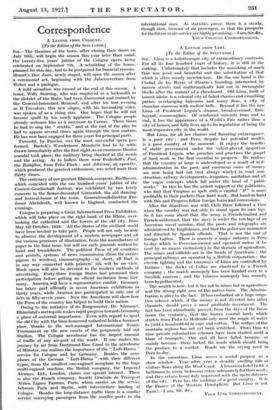A LETTER FROM LIMA. [To the Editor of the SPECTATOR.]
Sin,—Lima is a kaleidoscopic city of extraordinary contrasts. For all its four hundred years of history, it is still in the making. Unfortunately that includes the unmaking of much that was good and beautiful and the substitution of that which is often merely meretricious. On the one hand is the Ciudad de los Reyes of Pizarro's founding, intersected by narrow streets and mathematically laid out in rectangular blocks after the manner of a chessboard. Old Lima, built of honest adobe, is a colonial city of faded charms and crumbling patios, overhanging balconies and many fleas, a city of churches sonorous with mellow bells. Beyond it lies the new Lima of President Legufa's dreams, broad-avenued, flam- boyant, commonplace. Of reinforced concrete from end to end, it has the appearance of a World's Fair rather than a city of homes, and fully lives up.to its. reputation of being the most expensive city in the world.
But Lima, for all her charms and flaunting extravagance, is a poor city ; and Peru, despite her potential wealth, is a poor country at the moment. It enjoys the benefit.; . of stable government under the velvet-gloved despotism of President Leguia, who preaches and practises the gospel of hard work as the first essential to progress. He realizes that the country at large is undeveloped as a result of mut- administration in the past, and enormous sums of money are now being laid out (not always wisely) in road con- struction, railway developments, irrigation, sanitation and all the vague concepts which fall under the head of " public works." In this he has the ardent support of the politicians, ' who find that Progress as spelt with a capital " P " is more profitable to their pockets than hard work. But hand-in-hand with this and Progress follow foreign loans and concessions. After the disastrous war with Chile there followed a. time when the country was not able to stand upon its own legs. So it has come about that the army is French-trained and French-uniformed, that the navy is under the tutelage of an American naval mission, that the posts and telegraphs arc administered by Englishmen, and that the police are instructed and directed by Spanish officials. That is not the end of foreign tuition. There is scarcely a major industry in Peru to-day which is Peruvian-owned and operated unless it be (and by no means exclusively) in the domain of agriculture. The mines and oilfields are in the hands of Americans ; the principal railways are operated by a British corporation ; the electric lighting and the tramways of Lima are controlled by Italians ; the docks of Callao are chartered to a French company ; the match monopoly has been handed over to a Swedish concern ; and the tobacco monopoly haS recently been hypothecated.
The wealth is here, but it lies not in mines but in agriculture and the strong right arm of the native-born. The Adminis- tration is alive to the fact. It has embarked on a huge irriga- tion scheme which, if the money is not diverted into other channels, should prove a most profitable investment. The fact has been abundantly proved, from the days of the Incas down the centuries, that the barren coastal lands which stretch from Paita to Mollendo only need the magic of water to yield a hundredfold in cane and cotton. The surface of the montana regions has not yet been scratched. From time to time private colonization schemes have been started amid a blare of trumpets. One and all have failed because—or mainly because--there lacked the roads which should bring the produce to a market. Roads are the crying need in Peru to-day.
In the meantime, . Lima serves a useful purpose as a show window. Year after year a steadily swelling tide of visitors flows along the West Coast. A luxurious hotel (with a bathroom to every bedroom) caters adequately for their needs, and they return home duly impressed with the up-to-dateness of the city. Peru has the makings of a great country. It is the France of the Western Hemisphere. But Lima is pot Paris !--I am, Sir, &c.,
YOUR Lm.n CORRESPONDENT.






























 Previous page
Previous page